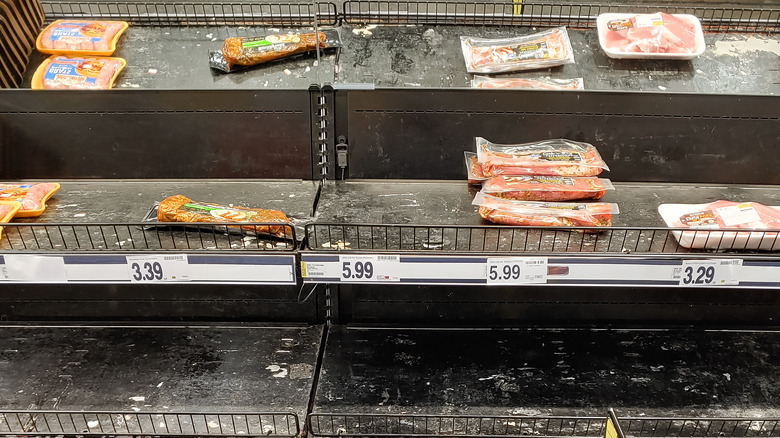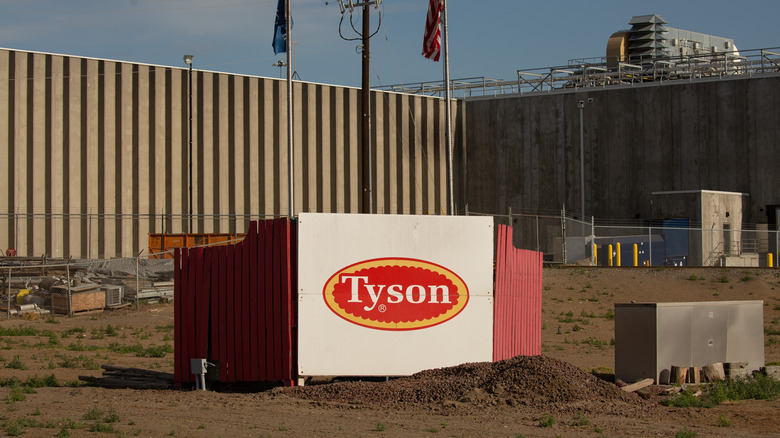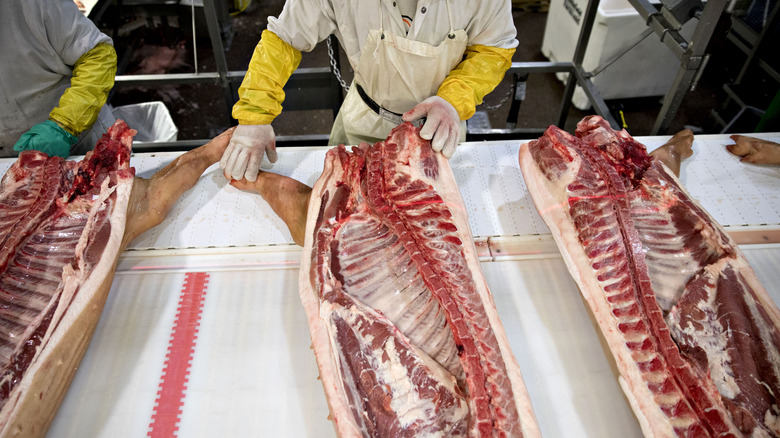Government Report Claims Meat Companies Lied About COVID Shortage
Who can forget the early days of the coronavirus pandemic, when supermarket shelves were stripped of household essentials and grocery basics were hard to come by? As the world went from business as usual to shelter in place, stores saw a run on different foods from milk to eggs and meat products, the effects of which we continue to see today.
And when meatpacking plants had to close because scores of workers were catching — and dying from — COVID-19, executives began to sound the alarm that a meat shortage was at hand, per USA Today. In a statement released at the time, Smithfield CEO Kenneth Sullivan stated: "The closure of this facility, combined with a growing list of other protein plants that have shuttered across our industry, is pushing our country perilously close to the edge in terms of our meat supply ... It is impossible to keep our grocery stores stocked if our plants are not running." But it turns out, that might not have actually been the case.
In a recently released report, the House Select Subcommittee on the Coronavirus Crisis says the claims made by the country's meatpacking industry at the time warning of "an impending protein shortage were flimsy if not outright false." In the in-depth, far-reaching report on the meatpacking industry's behavior during the early days of the pandemic, the committee also said the claim was made to "justify operating meatpacking plants under dangerous conditions."
The meatpacking industry successfully lobbied to keep plants operating
In its report, the House Committee says meatpacking companies had successfully lobbied political appointees at the U.S. Department of Agriculture (USDA) to keep plants running, even as they tried to muzzle what they called "pesky health departments" in the process. The companies allegedly also convinced the Donald Trump White House to push aside concerns from both state and local health departments that the industry needed to deal with the coronavirus risk, because to do so would impact productivity.
The report further reveals that both Smithfield and Tyson pushed for an executive order that would be signed by Donald Trump to shield them against lawsuits from worker illnesses and death. A draft of the proposed order was prepared by Tyson's legal department and shared with the USDA. The Trump administration eventually invoked the Defense Production Act in an executive order designed to keep the plants open, via The Guardian.
The findings were reached after the bipartisan committee sifted through 151,000 pages of documents, made calls with meatpacking union representatives and workers, and conducted interviews with former government officials, as well as state and local health authorities. The investigation was announced in February 2020 by Representative James Clyburn, shortly after the Biden administration took office.
Meatpacking companies saw record exports during the period
There was a cost to keeping meatpacking facilities regardless of circumstance. Research conducted by UC Davis shows that 334,000 COVID-19 cases were traced back to these facilities and that the economic impact of these illnesses — arising from short term health care costs, lost wages, and deaths — amounted to $11.2 billion. UC Davis adds that figures showing both the economic impact and infection rate are conservative. The study, says its lead author Tina Saitone, "likely understates true economic losses."
And while we didn't know it then, figures from the U.S. Census Bureau show that at the same time, the U.S. sold more than $22 billion worth of meat in overseas markets, and the industry saw its highest export level since 2014, per the Midwest Center for Investigative Reporting. The Washington Post further says that for most of 2020, JBS sold more pork to China than it had during 2017, while Smithfield had sent 90% more pork products during the same period.
The meatpacking industry responds
Without directly addressing the House Select Committee's findings, the North American Meat Institute's president and CEO Julie Anna Potts told CNN that the report "distorts the truth about the meat and poultry industry's work to protect employees during the COVID-19 pandemic."
Potts added that "The Committee could have tried to learn what the industry did to stop the spread of COVID among meat and poultry workers, reducing positive cases associated with the industry while cases were surging across the country. Instead, the Committee uses 20/20 hindsight and cherry picks data to support a narrative that is completely unrepresentative of the early days of an unprecedented national emergency."
Smithfield similarly told CNN it had taken "every appropriate measure to keep [its] workers safe," while Tyson said it would review the report. Former Secretary of Agriculture Sonny Perdue, who now serves as Chancellor of the University of Georgia, would not comment, with a spokesman for Perdu saying only he "is focused on his new position serving the students of Georgia."



